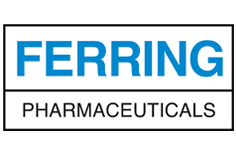Ferring Pharmaceuticals and North Zealand University Hospital announce eHealth collaboration aimed at transforming IBD patient care
Saint-Prex, Switzerland – 19 May 2016 –
To mark World IBD Day 2016, Ferring Pharmaceuticals and North Zealand University Hospital in Copenhagen today announced a multi-year collaboration aimed at transforming the way in which patients with inflammatory bowel disease (IBD) and irritable bowel syndrome (IBS) manage their condition and receive medical care.
The new programme, fully funded by Ferring Pharmaceuticals and governed by North Zealand University Hospital, is based on an innovative eHealth platform that empowers patients to self-monitor and self-treat by enabling them to screen for disease activity, act proactively on their symptoms and increase adherence to therapy.
“In my clinical practice, IBD patients who are monitored by an eHealth programme have a reduced time-to-remission,” said Professor Pia Munkholm. “This effect is linked to the patient’s ability to more tightly monitor their condition on the web than in a standard care setting, giving users of the eHealth programme the opportunity to detect a relapse sooner.”
During the partnership, North Zealand University Hospital will also work to evaluate the role of the microbiome in patient responses to different treatments in an eHealth setting. North Zealand University Hospital has a deep understanding of the human microbiome and Ferring Pharmaceuticals, as a leader in the area of gastroenterology, shares a mutual interest in expanding research in this area.
“Ferring and North Zealand University Hospital both fully embrace the concept of eHealth and its positive effects in relation to patient empowerment,” said Per Falk, MD, PhD, Executive Vice President and Chief Scientific Officer at Ferring. “This partnership will assure continued focus on eHealth and generate personalised treatment for IBD patients.”
– ENDS –
About Inflammatory Bowel Disease (IBD)
Inflammatory Bowel Disease (IBD) is a chronic relapsing idiopathic inflammation of the gastrointestinal tract (GIT). The two most common forms of IBD are Crohn’s disease and Ulcerative colitis which together affect over 3.6 million persons worldwide. IBD is characterized by an aberrant mucosal immune response observed locally in GIT leading to impaired epithelial barrier function and tissue destruction. A combination of factors such as immune response, gut bacteria, environmental triggers and genes are all thought to contribute to the disease – and a treatment plan that includes both regular medical treatment and the right diet is therefore important to allow the patient to manage symptoms and live a normal life. Over the past decade IBD have emerged as one of the most studied human conditions linked to the gut microbiota.
About Irritable Bowel Syndrome (IBS)
Irritable Bowel Syndrome (IBS) on the other hand has no organic course, however, it has been linked to dysbiosis of the gut microbiota in many studies. IBS is the most common GI disorder affecting 10-15% in the industrialized world. Abdominal pain and altered bowel habits are the most bothersome symptoms for many IBS patients which greatly affect their quality of life. Treatment of IBS patients rely so far on symptom reduction. Many IBS patients have reported their symptoms to be triggered by meals or specific food – foods are also one of the most important environmental factors impacting the microbial composition in the gut.
About eHealth
eHealth (also known as Telemedicine) is relatively recent term for healthcare practice that can encompass the use of telecommunication and information technologies to provide physical and psychological diagnosis and treatments at a distance, including telemonitoring of patients functions.
About Microbiota
The microbiota can be considered a “new organ” which actually constitutes 2 kg of our body and an estimated 80 % of its components has not yet been cultivated.
About Ferring Pharmaceuticals
Headquartered in Switzerland, Ferring Pharmaceuticals is a research-driven, specialty biopharmaceutical group active in global markets. The company identifies, develops and markets innovative products in the areas of reproductive health, urology, gastroenterology, endocrinology and orthopaedics. Ferring has its own operating subsidiaries in nearly 60 countries and markets its products in 110 countries.
To learn more about Ferring or its products please visit www.ferring.com.
For more information, please contact
Ferring Pharmaceuticals
Helen Gallagher
+41 58 301 00 51
helen.gallagher@ferring.com
Nicole Barraud-Estoppey
+41 58 301 00 53
nicole.barraud-estoppey@ferring.com
North Zealand University Hospital
Pia Munkholm
Professor
+4540858494
pia_munkholm@mail.dk

